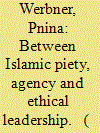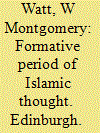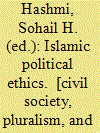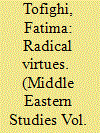|
|
|
Sort Order |
|
|
|
Items / Page
|
|
|
|
|
|
|
| Srl | Item |
| 1 |
ID:
160381


|
|
|
|
|
| Summary/Abstract |
In the face of the huge expansion in the number of women preachers throughout the Muslim world and beyond it, the paper proposes the need to theorise female ethical leadership – the subtle detour that Muslim women have been making to claim rights, including the right to leadership, within Islam, through their extraordinary acts of ascetic self-discipline (askesis). Building on Saba Mahmood’s Politics of Piety, the paper draws further on Foucault’s theory of the ethical subject, particularly in Volume III of The History of Sexuality, to demonstrate that it is women’s everyday asceticism coupled with their scholarly hermeneutical knowledge that is enabling these women to breach the citadel of male Islamic scholarship and leadership. In effect, they are foregoing certain personal freedoms in order to gain power and influence in religious spheres previously closed to them. In this their movement resembles feminist movements in Judaism and Christianity.
|
|
|
|
|
|
|
|
|
|
|
|
|
|
|
|
| 2 |
ID:
045869


|
|
|
|
|
| Publication |
Edinburgh, Edinburgh University Press, 1973.
|
| Description |
vi, 424p.
|
| Standard Number |
0852242452
|
|
|
|
|
|
|
|
|
|
|
|
Copies: C:1/I:0,R:0,Q:0
Circulation
| Accession# | Call# | Current Location | Status | Policy | Location |
| 012842 | 297/WAT 012842 | Main | On Shelf | General | |
|
|
|
|
| 3 |
ID:
049376


|
|
|
|
|
| Publication |
Princeton, Princeton University Press, 2002.
|
| Description |
xiv, 227p.
|
| Series |
Ethikon series in comparative ethics
|
| Standard Number |
9780691113104
|
|
|
|
|
|
|
|
|
|
|
|
Copies: C:1/I:0,R:0,Q:0
Circulation
| Accession# | Call# | Current Location | Status | Policy | Location |
| 046211 | 172/HAS 046211 | Main | On Shelf | General | |
|
|
|
|
| 4 |
ID:
183755


|
|
|
|
|
| Summary/Abstract |
Disillusioned by possibilities of political reform in an economically developing country, the Irani-an radicals of the 1960s and 70s adopted certain practices. These bodily techniques served both practical concerns and radical self-fashionings. That is, the guerrilla fighters had to familiarize themselves with mountains and forests, recruit members from the working class, and subsist on minimal means in communal houses. But they also would not succumb to the newly-emerging comprador bourgeois values that was, in their opinion, feeding imperialism. In this article I study those bodily practices in their global context, by reference to the practical and theoretical back-ground. It is interesting that while the paramilitary or theoretical aspects of these movements were not always appealing to the larger society, the bodily ethics could intrigue people from across the political or religious spectrum. The particular virtues of self-sacrifice, resilience, self-reliance, seriousness, among other things were cultivated by means of bodily practices. By these kinds of bodily resistance, Iranian radicals formed a subjectivity outside the dominant/dominated binary, where increasing political consciousness involved lifestyle changes on the most private surface.
|
|
|
|
|
|
|
|
|
|
|
|
|
|
|
|
|
|
|
|
|